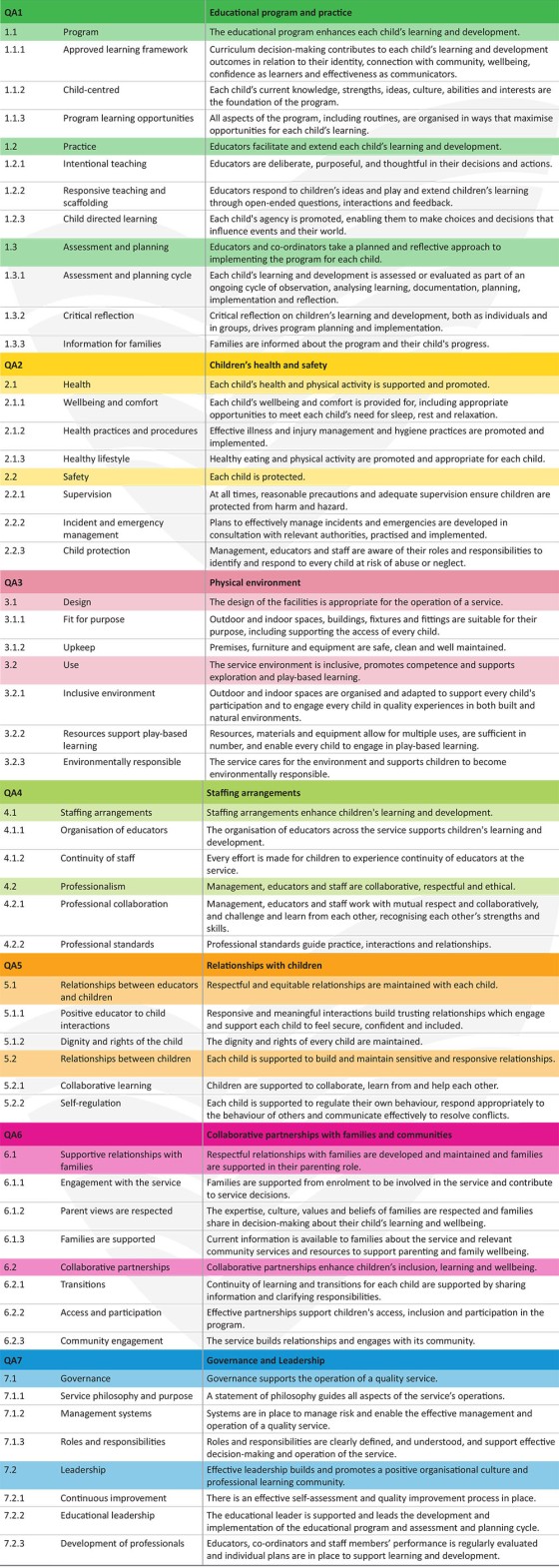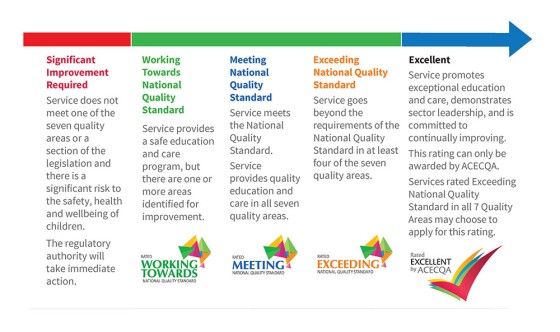Our Childcare Center API was built some time back as a tool to support some of our high-earning and proprietary strategies. While our specific purpose won't be discussed, this article introduces the features of our childcare API as part of Project Stargate - our plan to introduce the hundreds of data sources we use to build industry-leading services for our clients.
Sourced from the Australian Children's Education & Care Quality Authority  (ACECQA), the data details accredited childcare organisations and their performance when measured against the associated National Quality Standard (NQS). The ACECQA is the national body overseeing the implementation of the National Quality Framework (NQF).
(ACECQA), the data details accredited childcare organisations and their performance when measured against the associated National Quality Standard (NQS). The ACECQA is the national body overseeing the implementation of the National Quality Framework (NQF).
While the ACECQA data itself is updated only occasionally we check for updates daily to ensure accuracy. That said, the search features on the ACECQA website (or the Starting Blocks  website) is the only information that can be relied upon.
website) is the only information that can be relied upon.
Using the Aussie Childcare API
Endpoint for all requests is https://api.beliefmedia.com/platform/sources/childcare/childcare.json. Each request expects a valid API Key and, if requesting data other than information on a specific center, a data type (browse, search, or stats) is required.
Childcare Center Details
Each center has an associated service_approval_number and provider_approval_number. The search is conducted against the service_approval_number without the SE- prefix. To conduct a search for Community Kids Waterford Early Education Centre (with a service_approval_number of SE-00000002) we would make the following request: childcare.json?apikey=xxxxx&id=00000002. In this case the JSON unfolds to the following large array of data:
We provide the necessary 8-digit service_approval_number and provider_approval_number (without the prefix) in the response (as san and pan).
Some results have fields which are largely 'complete' while others have empty fields - such as the result shown above. Not all results return opening and closing times for any or all operating conditions.
Browsing Childcare Centers
Browsing results simply returns a paginated response for the entire data. Pagination is made with pg and number.
Querying childcare.json?apikey=xxxxx&type=browse returns the following:
Return page 2 with childcare.json?apikey=xxxxx&type=browse&pg=2.
Searching Childcare Centers
Searching childcare centers can be made using virtually any of the values returned in the 'Detailed' response. The key is listed as a search parameter with a value to match the field name with the exception of the following:
service_name, provider_legal_name, and service_address performs a partial search (so ?service_name=learning will match all centres with 'learning' in their name. The number_approved_places requires either number_approved_places_min or number_approved_places_max. When only one value is defined we'll search with that value as a lower or higher limit.
The quality_area_1_rating requires should include either 1 (Working Towards NQS), 2 (Meeting NQS), 3 (Exceeding NQS), 4 (Excellent), or 5 (Significant Improvement Required) as a search parameter. Multiple ratings should be separated by a comma. To search for rows where the NQS data is excluded, use 6 ('no value').
To search by postcode, use postcode=2000. However, if radius is set to true (radius=true), we use postcode as a reference point and list results by distance (in kilometres) from the postcode used in the query.
All operating start and end times should include a 4-digit 24-hour representation of the time. So, 5.30pm becomes 1730.
You may not search by phone, fax, or email.
In this example we'll conduct a search based on distance from a postcode. The query URL of childcare.json?apikey=xxxxx&type=search&service_name=learning&postcode=2000&radius=true returns the following:
The distance isn't overly accurate at this stage because we're using the postal code coordinates as a reference rather than the actual reverse-geocoded coordinates for the childcare center. This will change soon.
Childcare Centers Statistics
Quering childcare.json?apikey=xxxxx&type=stats returns a large number of stats relating to the data. A sample extract is as follows (there's far too much data to return for the sake of the example).
WordPress Plugin
We have a WordPress plugin available for clients (as we do a naked non-WordPress version) that creates a full searchable directory of all centres but it competes with the primary purpose of how we use the data. So, if you wanted a basic search website built we'd tend to encourage a standalone website rather than integrating it into your own website in any way. If you'd like us to build a small site for you please let us know and we'll have the project scheduled.
Access
Access to almost all of our services is limited to clients (an API Key is provided with a lifetime licence). If external access is required please make contact with us.
National Quality Standards
As a father to childcare-aged children, educating myself on the National Quality Framework (and associated standards  ), and understanding the grading system was important. For the sake of completion, and to provide additional understanding of the data, the following is a general overview of the National Quality Standard
), and understanding the grading system was important. For the sake of completion, and to provide additional understanding of the data, the following is a general overview of the National Quality Standard  (PDF, January 2019).
(PDF, January 2019).
The graphic below as sourced from the Starting Blocks website  provides a more general overview of the applicable ratings. You may come across a service with a classification of "Provisional - The service has not yet been assessed". This is because services are generally allowed 6 months or so after approval prior to being assessed, and during this time they show this rating.
provides a more general overview of the applicable ratings. You may come across a service with a classification of "Provisional - The service has not yet been assessed". This is because services are generally allowed 6 months or so after approval prior to being assessed, and during this time they show this rating.
Both the websites listed above provide insight into relevant legislation, regulations, and centre expectations.










